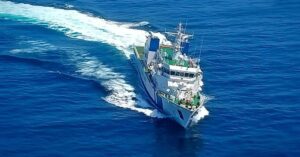India’s Development One Level High: Mango Export Boost!
India is moving towards rapid development and has now reached a new stage. India’s Development is on next level.

Sea transport and protocols are being introduced to export Indian mangoes and reduce spoilage. It will cut cost and also boost volume for distance and high-potential markets.
The agriculture and process to food products export development authority act, past part parliamentary in December 1985 and effective from February 13, 1986. This act established APEDA, which is the statutory body now leading the sea export initiated.
The sea route trials have begun. APEDA is collaborating with ICAR-CISH, for the trial shipment of mangoes.
Consequently, it is a benefit for India. The cost is as low as 1/8th of air freight. Now India will have the ability to export larger quantities than air shipments.
In addition to this, sea protocol is becoming a game changer. Its extended shelf life means it will maintain freshness and avoid spoilage across the journey. Also, shipping improves competition in premium markets so it cuts logistic cost.
Now India is enabled to meet the large demands and market presence.
Economic and GDP advantages:-
- Export Growth and Foreign Exchange: – mangoes exported by India worth US $56 million in fiscal year 2025.
Increase in export volume=increase in foreign exchange earnings=positive impact on GDP.
- Reduce Cost and Improve Competitive Edge- sea portals will cut the cost sharply as compared to air. Lower GST with 5% versus 18%.
- Rural and Agrarian Economic Development- If spoilage reduces, farmers’ income will increase and secondly, market access will also improve. Long term agricultural infrastructure and rural productivity will also increase by getting training in harvesting, grading, and export.
- Sectoral Multiplier- There is a huge opportunity for logistics, containerisation, port handling and supply chain segment. This will create jobs and increase GDP.
